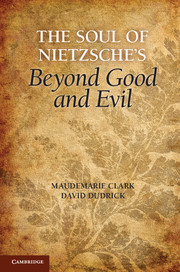Introduction
Learning to Read Beyond Good and Evil
Published online by Cambridge University Press: 05 August 2012
Summary
Why doesn’t Nietzsche write like a philosopher? Why doesn’t he set out his views clearly and give arguments for them? That he does not has led some readers to suppose that he is not a philosopher at all but only a poet, a guru, or a self-proclaimed wise man. Although this is hardly a crazy view, it is no longer a prominent one. The connections that can be drawn between Nietzsche and other figures in the history of philosophy – past and present – are just too numerous and interesting to deny that philosophy is the game he was attempting to play, the conversation he was attempting to enter. But then why doesn’t he write like other philosophers? In particular, does he minimize argument in his writings to reject something that is essential to philosophy as traditionally understood and practiced?
For a time, the standard view seemed to be that he does, that the ways in which he writes express a rejection of the whole “truth project” of traditional philosophy. Interpreters operating under the influence of postmodernism took Nietzsche to be an early proponent of its attack on truth, its rejection of all truth claims as illusory. Nietzsche does not write “like a philosopher,” according to this account, precisely because he rejects a concern with truth, reason, and argument. He rejects the “logocentric” paradigm of philosophy that informs the work of those who do write “like philosophers.” But this postmodernist view of Nietzsche’s philosophy is no longer dominant, having been successfully countered by “truth-friendly” accounts of Nietzsche. These find in his works a commitment to truth and, in his later works, a “uniform respect for science, truth, and the facts” (Clark 1990: 105). But then why does he write so as to suggest otherwise? What can defenders of the truth-friendly Nietzsche contribute to our understanding of why Nietzsche writes the way he does? These questions lie behind the present book. We do not address them directly, however, until the Conclusion. We think that answering the question as to why Nietzsche writes as he does requires more careful attention to how he writes than we find in the current literature. This attention is especially needed in the case of Beyond Good and Evil (BGE), the book with which we will be concerned here.
- Type
- Chapter
- Information
- The Soul of Nietzsche's Beyond Good and Evil , pp. 1 - 10Publisher: Cambridge University PressPrint publication year: 2012



